Florida Department of State and Division of Library and Information Services
- Typically, a proposed notice is open for 21 days for public comments, starting from the day it was published in the Florida Administrative Register.
- 1. To get a list of all the rules currently open for comments, select the "Rules Open for Comments" tab.
- 2. Find the individual rule you are interested in and select the number under the notice ID column.

Figure 1
- 3. Locate the COMMENTS section on the notice's page:

Figure 2
- 4. Send a one-time comment
- A. Select "Send a one-time comment to the Agency".
Note: If you want to save your comment, you must be logged in (create a profile).
- B. CLICK the "Make Comment" button.
- C. If you choose to send a one-time comment, you will get the following screen:
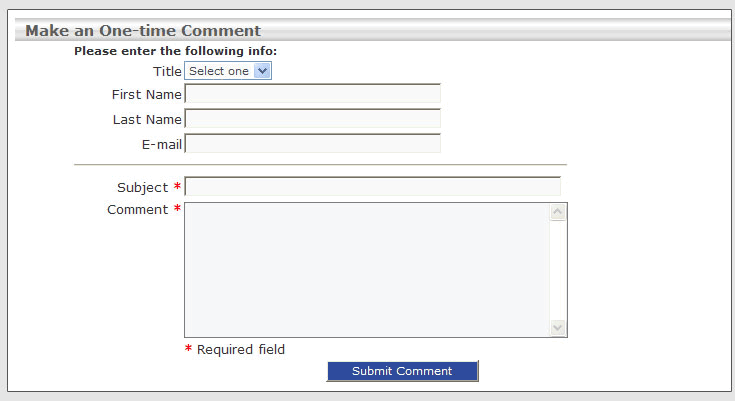
Figure 3
- D. We require a subject and your comment; if you wish, you may provide a title, first and last name and e-mail address. Providing your name and e-mail address does not guarantee that you will be contacted. If you want someone from the agency to contact you, you must log in and select "Communicate with the Agency".
- E. CLICK the "Submit Comment" button.
- 5. Communicate with the Agency with saved comments and agency replies.
- A. Select "Communicate with the Agency with saved comments and agency replies".
- B. CLICK the "Make Comment" button.
- C. If you are not already logged-in, the Subscriber Login page will be displayed. Enter your username and password and CLICK "Login".
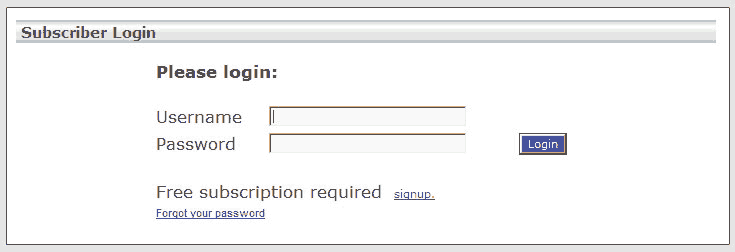
Figure 4
- D. On the "Make Comment" form, choose your role, give your comments a subject, and write your comments in the Comment box.
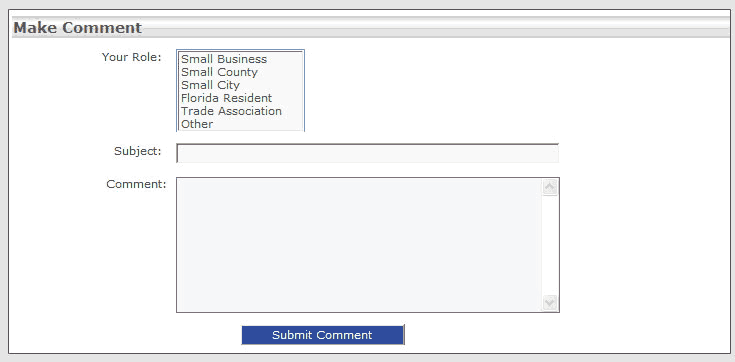
Figure 5
- If you are interested in what a Department or an Agency is doing, you can subscribe to e-mail notifications on our website and receive regular updates on rulemaking, public meetings and other activities.
- 1. Create a "MyFLRules" account
- 2. Once you have an account, log in on the home page:
.jpg)
Figure 6
- 3. After you log in, go to the "Advanced Search" page.
- 4. From the "Advanced Search" page, select the "Search in the Florida Administrative Register" checkbox.
- 5. Select the Department Name and select either "All Divisions" or the specific division(s) you would like to follow. Please note you may select multiple divisions by holding down the Control (Ctrl) key, or the Command key on a Mac.
This example (Figure 7) shows the Department of State and All Divisions selected.
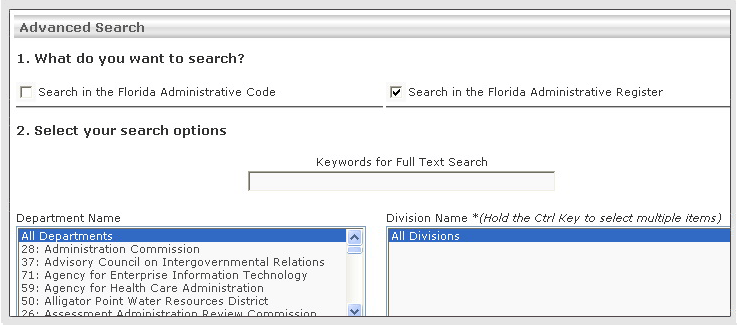
Figure 7
- 6. CLICK the "Search" button. The results of your search will be provided on the "Advanced Search Results" page.
- 7. At the bottom of the "Advanced Search Results" page, CLICK the "Save to My Alert Profile" button. (see Figure 8)
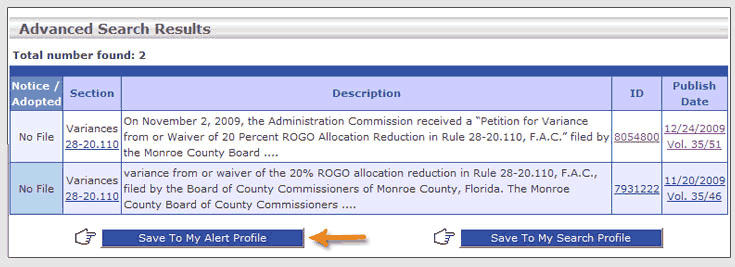
Figure 8
- 8. The "Save Alert Profile" page will open (see Figure 9). Enter a Profile Name and CLICK the "Save To My Profile" button.

Figure 9
- 9. Save Alert Profile Page contains a profile name field and the Save to My Profile button.

Figure 10
- You are able to delete alert profiles, so you no longer receive any alert emails.
- First, login,
Click on a profile name to delete

- Click on Delete This Profile
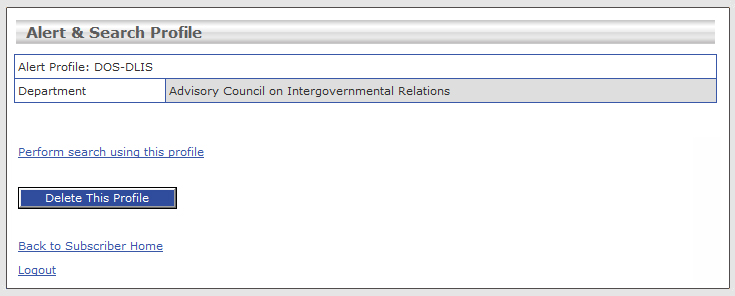
- Creating an account on MyFLRules enables you to:
Save and track your comments on proposed rules and other notices
Receive e-mail alerts when new notices are published
Save searches
- 1. To sign up, go to the Subscriber sign-up page (see Figure 11).
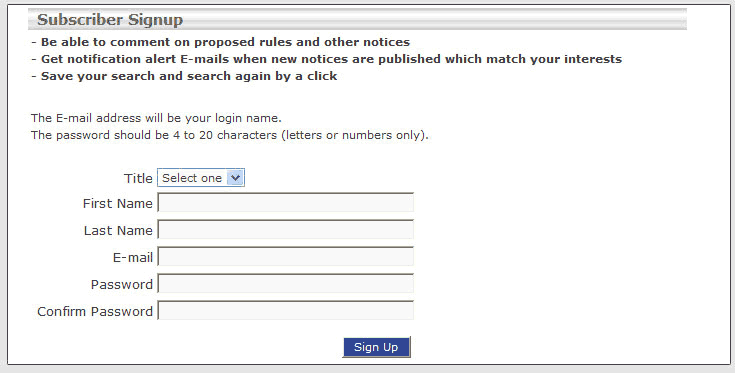
Figure 11
- 2. Select a title from the drop-down list, enter your name and e-mail address. The e-mail address will be your login name. Choose a password. The password should be 4 to 20 characters (letters or numbers only).
- 3. The Subscriber Sign-up page will confirm your subscription with the following message (see Figure 12).

Figure 12
- What is Rulemaking?
"Rulemaking" is defined as the adoption, amendment or repeal of a rule. In its simplest form, rulemaking consists of drafting the rule text, providing notice to the public, accepting public comment and filing the rule for adoption. However, rulemaking can become more complicated, involving many more steps.
- What is a Rule?
According to Chapter 120, Florida Statutes, Administrative Procedure Act (A.P.A.): Rule means each agency statement of general applicability that implements, interprets, or prescribes law or policy or describes the procedure or practice requirements of an agency and includes any form which imposes any requirement or solicits any information not specifically required by statute or by an existing rule. The term also includes the amendment or repeal of a rule.
- What is the Florida Administrative Code?
The online Florida Administrative Code (FAC) is the official compilation of administrative rules for the state of Florida. The Department of State oversees the publishing of the FAC and updates it weekly.
- What is the Florida Administrative Register?
Florida Administrative Register (FAR) is the title of a daily publication which gives the public current information about the status of rules moving through the rulemaking process including proposed rules; emergency rules; and notices of change, corrections and withdrawals. The Register also includes notices of agency public meetings, workshops and hearings, and miscellaneous actions required to be published by statute.
Below is a list of notices required to be published in the FAR:
Notices of Rule Development
Notices of Proposed Rules
Notices of Change, Correction and Withdrawal
Emergency Rules
Petitions and Dispositions Regarding Rule Variance and Waiver
Notices of Meetings, Workshops and Public Hearings
Notices of Petitions and Dispositions Regarding Declaratory Statements
Notices of Petitions and Dispositions Regarding Non-rule Policy Changes
Announcements and Objection Reports of the Joint Administrative Procedures Committee
Notices Regarding Bids, Proposals and Purchasing
Notices of Intent to Adopt rules pursuant to Sections 120.54(6), 120.54(1)(i)2., and 403.8055, Florida Statute
Notices of Invalidation of a Proposed or Effective Rule
- How do I subscribe to the Florida Administrative Register?
Electronic Version:
Current and past issues of the FAR are available for viewing online here at: https://www.flrules.org/Default.asp. Users of the e-rulemaking website may subscribe, free of charge, to receive e-mail notification of notices submitted by agencies at: https://www.flrules.org/subscriber/signup.asp.
- What Laws and Rules Govern Rulemaking?
Chapter 120, Florida Statutes, Administrative Procedure Act (A.P.A.), sets forth the rulemaking procedures that agencies must follow. The Department of State, through its legislatively-delegated rulemaking authority, has adopted Chapter 1-1, Florida Administrative Code (F.A.C.), to interpret, implement and make specific the requirements of Chapter 120, Florida Statutes.
- What authority does an agency need to adopt a rule?
A grant of rulemaking authority and a specific law to be implemented are required before an agency may draft a new rule, amend a current rule, or repeal an existing rule (reference). Furthermore, an agency may adopt only rules that implement or interpret the specific powers and duties granted by the enabling statute. No agency shall have authority to adopt a rule only because it is reasonably related to the purpose of the enabling legislation and is not arbitrary and capricious or is within the agency's class of powers and duties, nor shall an agency have the authority to implement statutory provisions setting forth general legislative intent or policy.
- What is Reference Material?
When a rule makes reference to a form, document, or related item, it must be "incorporated by reference" into the rule. Reference materials may refer to specific ordinances, standards, specifications, maps, graphs, charts, reports or similar materials generally available to affected persons and published by either a governmental agency or a generally recognized professional organization. Any forms, including instructions, which solicit information or impose requirements not already required by statute or existing rule and which are used by an agency in its dealings with the public shall be incorporated by reference in the rule if it meets the definition of a "rule."





.jpg)







